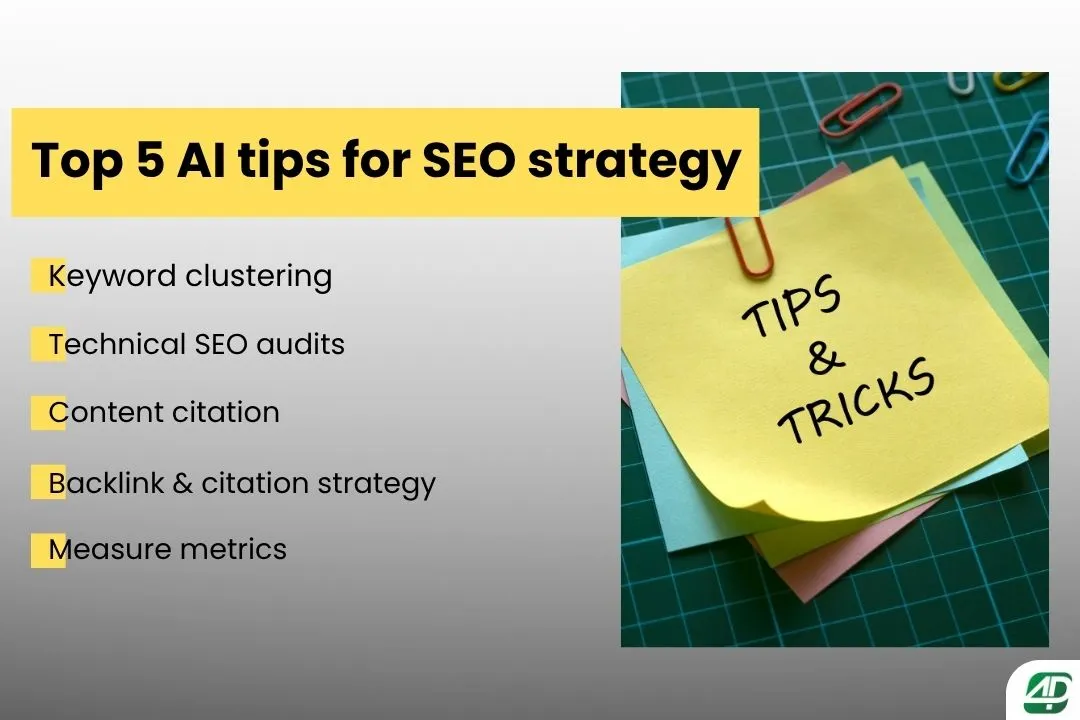Introduction
In recent years, AI has become the primary search engine over traditional ones, and today, most individuals prefer AI searches. This has led to a new chapter in B2B SEO and content marketing that focuses on optimizing for showing in AI searches.
For B2B content marketing, that means your SEO strategy must evolve to be easily cited by AI. Because if your brand doesn’t appear in these AI-generated responses, you’ll lose website ranking stake.
Understanding the role of AI in B2B SEO
A 2025 report found that AI-driven search now influences over 34% of qualified B2B leads, outpacing traditional SEO channels. By leveraging AI in SEO content optimization, you can reach buyers at multiple touchpoints, personalize their experience, and make your brand visible in the new AI-powered search landscape.
Highlights:
Top 5 AI tips for SEO strategy

1. Keyword clustering :
Traditional SEO treats keywords as isolated targets. AI content generation for SEO turns that approach into cluster-related keywords by search intent.
For example, if you are writing a blog about “AI SEO tools” you can build a topic cluster around it, how AI transforms content optimization, AI tools for B2B lead generation, and AI-driven keyword mapping.
To focus on the AI in keyword research, you can adapt the following pointers.
- Schedule content topics to the B2B buyer journey, ensuring you’re answering real questions at every stage, from awareness to decision.
- Identify long-tail keywordsthat your audience is already asking about AI.
To understand more about keywords, check this blog about Long-Tail Keywords: The Secret to Successful B2B SEO.
2. Technical SEO audits :
Technical SEO means endless spreadsheets. Doing a technical audit involves checking error pages to website loading speed. AI in SEO is changing the whole scenario, along with some AI SEO audit tools. Such as SEMrush, MarketMuse, or Clearscope to audit your website faster and more precisely.
Here’s how you can make it work:
- Use predictive analytics for SEO to forecast which site fixes will improve ranking potential and the upcoming trends to rank above the competitors.
- Leverage AI-based accessibility checks to optimize for Core Web Vitals and structured data.
By automating these steps, your SEO team can focus on strategy rather than manual errors.
3. Content citation :
When generative engines summarize answers, they pull data from trusted, well-structured content. That means your blog, article, or landing page needs to be:
- Authoritative by including authentic information, statistics, and verified insights.
- Structural with sub-heads, schema markup, and clear topic flow.
If AI can understand and trust your content, it’s more likely to cite your brand in its summaries, boosting both visibility and credibility.
Check our blog on How ChatGPT Is Revolutionizing Content Marketing for B2B Industrial Companies? which covers how to align topics, tone, and trust signals.
4. Backlink & citation strategy :
In the AI era, backlinks still matter, but mentions matter more. AI systems recognize authority from multiple social signals, including industry citations, PR mentions, quotes in reports, interviews, and online discussions, and consistent thought leadership across multiple platforms
Here’s what you can do:
- Partner with credible B2B publishers.
- Encourage guest posts and cross-citations.
- Optimize your B2B social media marketing by posting articles and posts on LinkedIn and Medium with consistent messaging.
Pro tip: Every mention trains AI engines to associate your brand with expertise.
5. Measure metrics :
Rankings still matter, but they’re no longer the whole story. You need to measure:
- AI visibility: How often does your brand appear in AI answers?
- Citation frequency: How many times are you referenced in summaries?
- Engagement depth: How long users stay after discovering you via AI search?
These metrics provide a more realistic view of brand presence, not just search volume. You can combine these insights with lead tracking tools to connect visibility, engagement, and conversion.
Read our earlier blog on Are Your Websites Optimised for Both Users and AI Bots. It breaks down how digital-first adoption drives leads on your website and drives business growth.
How The 4P Solutions can help you?
At The 4P Solutions, a leading B2B SEO agency in Mumbai, with more than a decade of experience, we specialize in helping B2B companies to rank on search engines even in the AI era. We cover all aspects of AI in search engine optimisation, from AI on-page SEO to AI-based link building.
For more information regarding your B2B SEO services, reach out to us at mktg@the4psolutions.com or call us at +91 85919 37177
Conclusion
B2B brands that integrate AI into their strategy today will dominate tomorrow’s search landscape. AI SEO is not going to replace the SEO part, but it’s redefining it.
At The 4P Solutions, we help businesses build B2B SEO strategies that blend human creativity with AI precision, helping you stay visible in both search engines and generative engines.
FAQ’s:
AI helps to do repetitive tasks faster, but to rank on search results, expertise and creativity are needed, hence AI won't replace SEO.
AI can help you with the research and structural layout. Even to sort the keyword cluster, AI will assist you according to user intent and the marketing funnel.
Use AI SEO tools to improve your SEO efficiency and optimize your content so AI-powered search engines and platforms recognize its quality and surface it to their citations for easy visibility.

